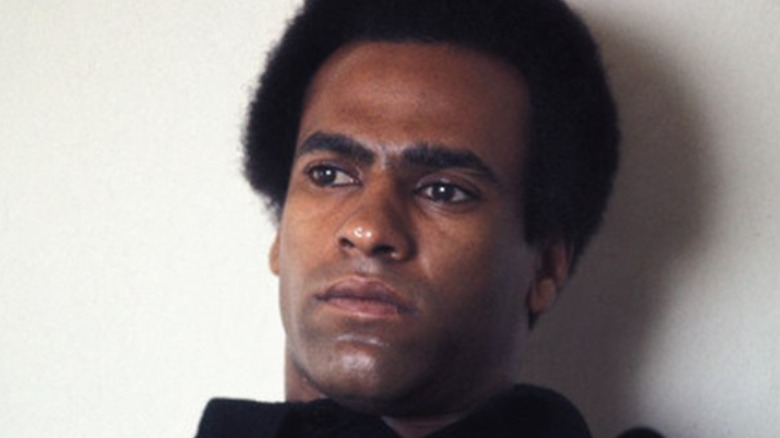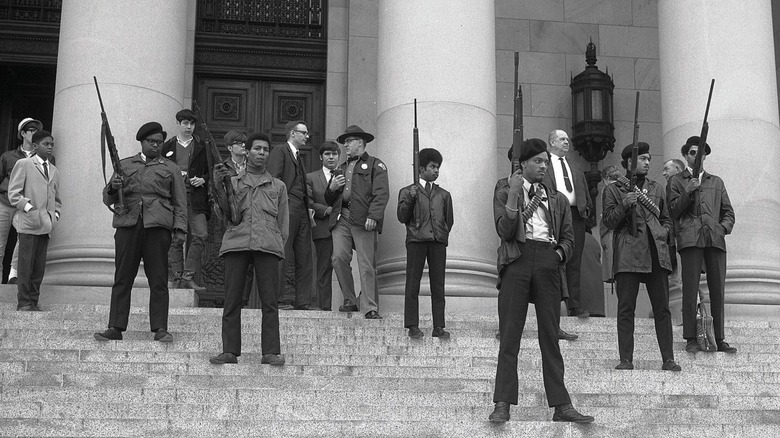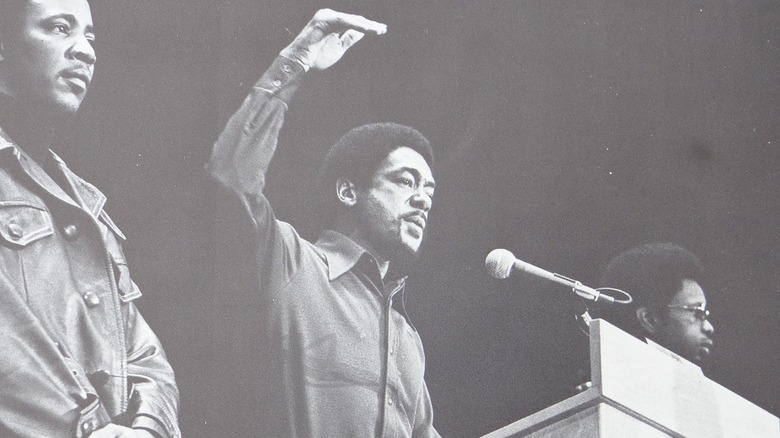The Relationship Of Black Panther Founders Bobby Seale And Huey P. Newton Explained
The relationship between Bobby Seale and Huey P. Newton began when the two were fellow students at Merritt College in Oakland, California (per History). Seale had just been released from the U.S. Air Force after being court-martialed on a bad conduct charge following an altercation with an officer (via PBS). In the book "Seize the Time: The Story of the Black Panther Party and Huey P. Newton," Seale revealed that he wanted to study engineering, but began to gravitate toward Black American history and how to help solve the problems Black people faced daily in the U.S.
Huey Newton (pictured) graduated from Oakland Technical High School in 1959 and soon found himself embroiled in politics as a student at Merritt (per The New York Times). He and Seale both became active in Merritt's chapter of the Afro-American Association. The two young men first met when they attended a protest of the U.S. blockade of Cuba, per "Seize the Time". After they took part in another protest together — this time against their school's "Pioneer Days" celebration because it left out the Black American contributions — they formed the Negro History Fact Club, a group that put pressure on Merritt to offer classes in Black History, according to History.
In 1966, Seale and Newton would collaborate on the formation of a group that would become a pivotal piece of 1960s culture. Drawing on their belief in Marxism and their belief that Black Americans were being unfairly treated by the police, they founded the Black Panther Party for Self-Defense, later shortened to the Black Panther Party.
The Black Panther Party grows in numbers
Seale and Newton put their new organization to work immediately and developed "The Ten Point Program" to summarize the Black Panther objectives. According to History, its focus was not just centered on ending the horrific police brutality that Black men were suffering from. Seale and Newton drew from their Marxist ideologies and used the Black Panther political platform to push for better employment opportunities, fair and equal housing, and equal protection under the law. At its peak, the Black Panther Party had members in nearly every major city in the United States and more than 2,000 members. Though they were not successful in getting any candidates elected to public office, they were a significant part of the greater Black Power movement that worked tirelessly for civil rights causes.
Even though they organized armed patrols to protect Black neighborhoods from the police that they felt were marginalizing them, the Black Panther's aims were much deeper. Biography tells us that the Black Panthers were also heavily focused on community outreach. Perhaps feeling that the public needed an organized account of the movement he co-founded, Seale wrote the aforementioned book, "Seize the Time: The Story of the Black Panther Party and Huey P. Newton." It was published in 1970.
Seale and Newton became targets of the FBI not long after the Black Panthers became active. By the early 1970s, they found themselves fighting bitter battles for freedom from behind prison walls.
Seale and Newton post-Black Panther Party
Though Huey Newton and Bobby Seale worked together to start a revolutionary movement, they both forged their own paths and dealt with their own court battles. Per Biography, Newton had some ups and downs in the last decade of his life, including two accusations of murder along with various weapons and drug charges, but he also successfully earned his Ph.D. in Social Philosophy from the University of California at Santa Cruz.
Seale (pictured) became a staunch anti-Vietnam War activist and was in Chicago during the tumultuous 1968 Democratic National Convention. He was arrested on bogus charges of conspiring to start a riot along with seven other defendants who would later be known as "The Chicago Eight." After Seale was removed from the courtroom for contempt and ordered to stand for a separate trial, the moniker of the remaining defendants became "The Chicago Seven." Seale was later arrested for the murder of a fellow Black Panther thought to be an FBI informant, but was released after a hung jury (per Biography).
In 1989, Newton was killed after being targeted by a prison gang called the Black Guerilla Family, (via The Los Angeles Times). According to The Washington Post, Seale said of his former partner's death: "However Huey Newton died, he made a profound contribution. He didn't take no crap from the racists, in the streets or in the courtrooms. The man put his life on the line. It was a very gallant piece of history that we were involved in for those years in the Black Panther Party. We had one hell of a revolutionary time together."


